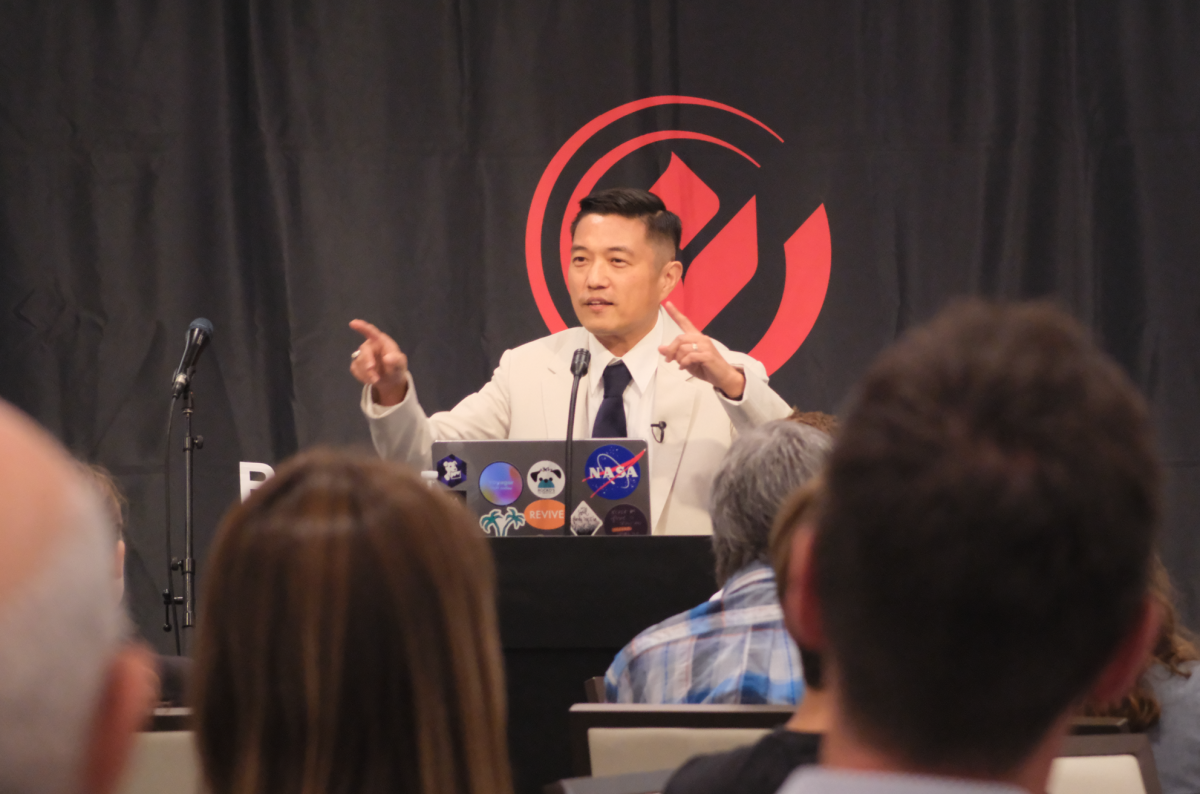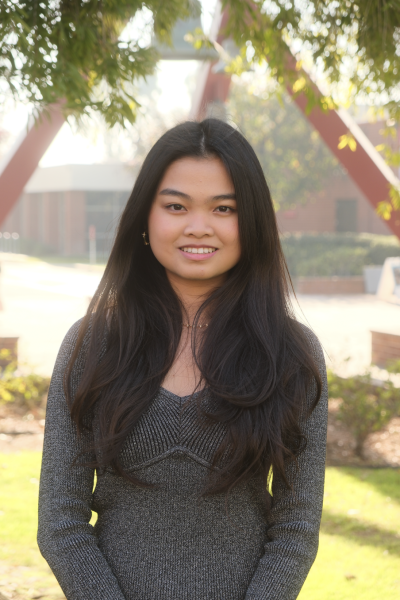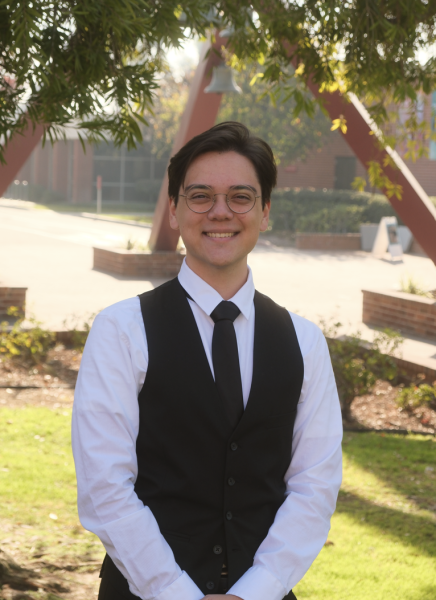The School of Science, Technology, and Health (SSTH) welcomed a new associate dean, Yohan Lee, in the middle of Fall 2023. Initially, Lee worked part-time remotely from the Bay Area while managing his company, then moved with his whole family to Los Angeles this summer to fully integrate into his role, serving SSTH and Biola University.
FROM LANGUAGE TO LABS
Lee was born in Korea to an engineer and a teacher. His father’s work in engineering garnered attention and needed patent protection in the US, leading Lee and his family to move to Silicon Valley when he was three. Lee graduated from the University of California, Los Angeles (UCLA) with a B.S. in neuroscience and later received his PhD in Human Genetics there, too. His areas of expertise are human genomics: cellular, computational, and mathematics.
Lee did not originally choose neuroscience for his undergraduate degree. He started as an English major with a French minor due to his passion for the written word and the importance of communicating well.
Lee also had a passion for dentistry.
“Originally, I thought I would be a dentist because I really liked the idea of being able to help people with physical suffering immediately,” he explained.
However, a conversation with one of his professors clarified his calling, prompting him to switch to neuroscience.
“You’re clearly holding back on what you can accomplish. It seems like you are not pushing yourself hard enough,” Lee’s professor said. “Why do you want to become a dentist?”
Lee replied, “I think I can grow teeth in the lab which needs molecular signals from cranial nerves.” The professor told Lee he should look at neuroscience.
After making the switch, he immediately immersed himself in the field and worked as a researcher in a neuroscience lab.
“My initial work in neuroscience was trying to come up with physiological methods to get the brain off of narcotic drug addiction,” he said. “My first paper was published when I was 20, the [postdoctorate] I was working with was a brilliant fellow from Oxford; he taught me everything.”
Lee credited his first published paper to the generous mentorship he received and the relentless pursuit of knowledge through asking questions and the hard work that research requires.
He then continued to pursue his doctorate at UCLA in human genetics and genome sciences. This too was a story that glimmers with God’s grace and guidance.
HUMAN GENOMICS
Growing up, Lee was introduced to the world of startups as he saw his father’s startups navigate the financial rollercoaster. He told himself not to make that same decision and envisioned having a stable job by pursuing chemistry.
Just as artificial intelligence (AI) is today’s next big frontier, so was the human genome project in Lee’s time. The support of his parents to pursue bioinformatics solidified his vision and led him to deepen his studies.
One of Lee’s life axioms is that God never wastes anything. Although he did not become a dentist, his work in dentistry opened a door to another project.
“Because I was doing so much in dentistry, I got invited to a special dental conference that only faculty can go to. And that’s where I met this one woman who was essentially killing cancer using viruses. I went up to her and showed my paper and she allowed me to come into her lab. And next thing you know, she’s working with genome data.”
Lee saw the direct, tremendous impact this field has for cancer patients which led him to his PhD in human genomics. This resonates deeply with his desire to alleviate people with physical suffering.
REDEMPTIVE AI STARTUP
After completing his PhD, Lee worked at the National Institutes of Health (NIH), which he described as the “Jerusalem of biomedical sciences.” There, he attained his first grant to purchase robots for processing blood samples. This experience exposed him to machine learning and foreshadowed the trajectory of his vocation. He then worked at Booz Allen Hamilton and Google AI as a product deployment manager, and these experiences set him to create his own startup company, which later brought him to Biola.
Lee is the founder and CEO of Scaled Entelechy, a missional AI startup that aims to create AI software that helps people.
“We saw that AI is gonna get built and developed into a lot of different ways. For us, it was, let’s make AI that’s going to help people. Maybe other companies may not put that same kind of attention behind certain things. [So] we call it redemptive AI because we want to be able to do AI that’s going to help areas where the Bible tells us about biblical justice.”
He referenced Biblical justice for widows and sojourners and that justice also encapsulates education. One of their products is an education technology (ed-tech) product for English as a second language.
”We know that students who may not have English as [first] language or not spoken at home, it’s hard for them to learn English to pass English competency tests. The problem with that is when students don’t learn English properly in grade school, it affects their math abilities because they can’t learn math properly,” he pointed out.
The company also built an assessment tool for AI to teach AI, that can also evaluate its performance, and provides exercises on writing AI code, helping avoid bad habits they tend to see in AI software development. The company won 2nd place in the U.S. National Artificial Intelligence competition.
BEHIND ALL THE SUCCESS
From all his flying achievements, Lee emphasized that they were not achieved without countless hours of hard work and moments of failure.
“I was never the smartest kid in my class, I kept working at it, and I kept asking questions, and going to office hours and doing the best with what God gave.”
He shared a pivotal moment in his sophomore year of college.
“One day, I’m feeling down about myself, and I’m just reading the Gospel of John. Scripture came alive for me. When it talks about the light, penetrating through the darkness, and how Jesus was the Logos, the word at the beginning, even before the beginning of time, I just felt the Holy Spirit steal my heart and just love me for who I was, not what I wanted to be or not who I thought I should be.”
One of the most important spiritual disciplines for Lee is what’s called “Gospel Waltzing”. Gospel Waltzing involves a three-step, easy-to-remember process: repent, believe, obey.
Lee also remarked that David Guzik’s Bible commentary changed his life by helping him understand the Bible and the questions he had. He also advised students to be discipled in their local church through small groups or a discipleship program.
“The lie is that we do it alone,” he asserted.
TRANSITIONING TO THE ASSOCIATE DEAN POSITION
When Lee was approached for the position, what intrigued him was Biola SSTH’s mission, which is to be “the world’s foremost Christ-centered [science, technology, engineering and mathematics] STEM and health programs.” To become the top university in STEM and impact the world for Christ attracted him.
“If you’re not going to try and be the best, I don’t even want to bother. Because [only] that level of ambition and excellence sounds worthy of Christ,” he remarked.
His vision for SSTH is to equip students at the highest levels of capability.
“[It’s] not that we’re trying to force it so that you can be successful according to the world standards, but so that you can realize the dream and the vision that God has to grow us, not harm us, as what’s stated in Jeremiah 29,” he said. “There is no greater time now where we need more Christians involved in STEM.”
Some initiatives he’s working on include improving students’ assessment to tailor development to individual needs, recruiting potential new instructors this year and knowing companies’ expectations for hiring. He hopes to further prepare students for the job market through internships and employment opportunities, especially in a challenging economy for computer science graduates.
He also desires to help equip the next generation, whether it is in English, AI or STEM fields, emphasizing the value of communication, creation and practice.
“STEM skills are going to be in greater demand in the future, not less. Some people say, well, AI is gonna take away the need to write software,” he said. “I understand why people think that way, but from what I see, yes, you could have copilot helping write software and code. But at the end of the day, the most sophisticated things that humans want are going to need human-level sophistication. And that’s not easy.”
He emphasized the importance of collaboration, an all-team star is not only the greatness of a single player, but that they built up one another. Companies need to be able to trust the character of their team members, and he wants Biola students to stand out in excellence, leadership and behavior. The approach taken in doing something can be just as important as the task itself.
When trust becomes a rarity, it is a chance to be a light in the darkness. Lee believes the character reflected through work can be a pathway to sow seeds.
“When we do really great work, there will often be opportunities for us to share and witness about Jesus and sometimes we are the only person that that person will ever encounter [in sharing the Gospel],” he expressed.
STUDENTS: LOVE AND SERVE
Lee’s message to Biola students is clear: “We could be the biggest captain in the industry. But if we have not served the poor, if we have not served the rape victim, the orphan, somebody under oppression, an immigrant, or somebody who may have severe bodily malformations or disabilities, I think it’d be very scary if we tell the Lord, ‘I did nothing.’”
He summed up, “hold nothing in our lives back from Jesus, that if we hold something back in our lives from Jesus, we are asking to be enslaved by something else. Whereas if we are giving everything in our lives to Jesus, and asking him to use it, to His will and not our will. You will be able to lead an amazing life glorifying Jesus, and nothing compares to that.”







